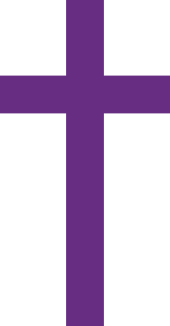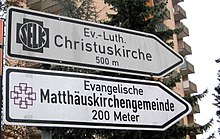Protestantism
The term Protestants, which has been used since 1529 and was originally political, is used in a narrower sense to refer to members of the Christian denominations that, starting in Germany (actually the Electorate of Saxony, from 1517) and Switzerland (actually the Canton of Zurich, from 1519), emerged primarily in Central and Northern Europe as a result of the Reformation of the 16th century and have since developed into various groups worldwide.
There are about 900 million Protestants worldwide, including 300 million in churches directly influenced by the Reformation (evangelicals) and 600 million in neo-Protestant (partly influenced by the revivalist movements of the 18th and 19th centuries) churches (mostly evangelicals).
Most Protestants are scattered in only a handful of denominational families: Lutherans, Reformed (including Calvinists, Zwinglians, Presbyterians, Congregationalists), Anglicans (including Episcopalians), Anabaptists (including Mennonites, Amish, Hutterites), Baptists, Methodists, Adventists, and Pentecostals. In addition, there are a number of micro-groups such as Arminians (including Remonstrants), Quakers and other English Dissenters (including the former Puritans and Independents), the Brethren movement, the Holiness movement (including the Salvation Army), Pietists (including the Haugians) or the Moravian Brethren.
Since 1817 (beginning in Germany) Protestant churches of different denominations have joined together in unions.
There are several interdenominational trends that help shape the various Protestant churches, such as Christian fundamentalism, liberalism, neo-orthodoxy, or paleo-orthodoxy.
New Protestantism: Evangelicalism, the Charismatic movement, the Neo-Charismatic movement, the house church movement (especially Chinese house churches), the African Independent Churches and other new movements (including many interdenominational, non-denominational and independent churches and megachurches) are growing and constitute a significant part of overall Protestantism.

Church flag of the Protestant Church in Germany, a symbol of the largest Protestant church federation in Germany. The use of the Latin cross is common for all Protestant congregations.
Protestant and Evangelical
In the 16th century, the "protestation" was a traditional legal instrument of imperial law by which a minority of estates and imperial cities could present their concerns at an imperial diet. The Latin verb protestari has a basic positive meaning: "to be called to witness for something", "to bear witness to something". Today, the terms "Protestant" (coined from the external perception by the Roman Curia) and "evangelical" (coined from the self-perception of the parishioners and their regional churches) are used interchangeably in the German vernacular. However, German churches standing in the tradition of the Reformation refer to themselves as "evangelical" rather than "Protestant." An exception is the Evangelical Church of the Palatinate (Protestantische Landeskirche). The terms "church(es) of the Reformation" and "Reformation church(es)" are also used.
In addition, there are the terms "Lutheran" or "A.B. (Augsburg Confession)", which designate the churches in the tradition of the Wittenberg Reformation, and "Reformed" or "H.B. (Helvetic Confession)", which designate the churches in the tradition of the Swiss reformers Ulrich Zwingli (Zurich), John Calvin (Geneva) and John Oekolampad (Basel). Depending on the form of organization, there are unions that abandon differentiation, such as the united churches of the Bremen Protestant Church or the United Church of Christ in the United States. In the area of the Evangelical Free Churches, designations such as Evangelical Free Church, Evangelical Methodist, Free Evangelical Congregation, Old Evangelical Baptist or Evangelical Free Congregation can be found.
"Evangelical" must be distinguished from the term "evangelical," which originated in the 20th century, especially when translated into or from other languages. In English-speaking countries, the terms "Protestantism" and "Protestant" are indispensable, since "evangelical" means "evangelical" in addition to "Protestant", especially in North America. Also, there is no English equivalent for the adjective "reformed." The adjective "reformed" means "reformed" and is used, for example, in designations for certain churches, such as Dutch Reformed Church. The historical term "evangelical" originated in the environment of Puritanism in England.

Expression of denominational diversity: signs for two different Protestant churches (one Evangelical-Lutheran and one Evangelical-United) in Wiesbaden
Introduction
More generally, denominations that arose after the Reformation are also called Protestant, which hold the same or similar principles as the Reformation churches and therefore distanced themselves from the Roman Catholic Church. In this sense, for example, the Anglican Church is counted as Protestantism. After the Declaration of Independence, American Anglicans called themselves the Protestant Episcopal Church in the United States of America. The Protestant Free Churches also belong to the Protestant spectrum. In the German-speaking world, these include the Mennonites, who came into being during the Reformation, as well as the Baptists, the Methodists, the Seventh-day Adventists and the Pentecostals. The Waldensians, who had already arisen in the 12th century, joined Swiss and French Protestantism respectively in the 16th century. The Presbyterians, Congregationalists and a number of other churches, which are widespread in the English-speaking world, belong to the Reformed church fellowship. The Unitarians also originated as a Reformation church, but part of them broke away from Christianity from the late 19th century. The Quakers also arose around the English Reformation.
The most influential reformers were Martin Luther and Philipp Melanchthon (Evangelical Lutheran Churches), Ulrich Zwingli, John Calvin and John Knox (Reformed Churches), and Thomas Cranmer and Martin Bucer (Anglican Church). The leading theologians in the early days of the free churches with the largest membership were Konrad Grebel, Felix Manz and Menno Simons (Anabaptists/Mennonites), Robert Browne and John Cotton (Congregationalists), Thomas Helwys and John Smyth (Baptists), George Fox (Quakers), and John Wesley, Charles Wesley and George Whitefield (Methodists).
The German Protestant regional churches have organized themselves into the Evangelical Church in Germany (EKD). The Protestant Free Churches are united in the Association of Protestant Free Churches. Through emigration and mission, larger or smaller Protestant churches (world Protestantism) have arisen in many countries of the world. They are growing particularly strongly in China and Latin America. Most Lutheran churches are united in the Lutheran World Federation, the Reformed churches in the World Communion of Reformed Churches. The Protestant free churches also have corresponding international associations, such as the World Council of Methodist Churches, the Baptist World Alliance and the Mennonite World Conference. The vast majority of Protestant churches are members of the World Council of Churches. Evangelicals form the majority of the population in Scandinavia, the United Kingdom, the United States, Australia, Iceland and New Zealand. In Germany, the Netherlands and Switzerland, there are about the same number of Protestants as Catholics.
· The most influential Protestant thinkers and founding personalities (images when available)
· 
Philipp Melanchthon (1497-1560), Lutheran
· 
Huldrych Zwingli (1484-1531), Reformed
· 
Martin Bucer (1491-1551), Reformed
· 
Johannes Oekolampad (1482-1531), Reformed
· 
John Calvin (1509-1564), Reformed
· 
John Knox (1514-1572), Reformed
· 
Andreas Bodenstein (1486-1541), Lutheran/Anabaptist liaison figure
· 
Thomas Müntzer (1489-1525), liaison figure Lutheran/Anabaptist
· 
Balthasar Hubmaier (1485-1528), Anabaptist
· ,_geestelijk_vader_van_de_doopsgezinden,_Bestanddeelnr_935-0851.jpg)
Menno Simons (1496-1561), Anabaptist
· 
Sebastian Franck (1499-1542), Anabaptist
· 
Kaspar Schwenckfeld (1490-1561), founder of the Schwenkfeldians
· 
William Tyndale (1484-1536), Anglican/Lutheran liaison figure
· 
Thomas Cranmer (1489-1556), Anglican
· 
Matthew Parker (1504-1575), Anglican
· .jpg)
Richard Hooker (1554-1600), Anglican
· 
Jacobus Arminius (1560-1609), reformer and founder of Arminianism
· 
John Smyth (1566-1612), English dissenter and founder of the Baptists
· 
Roger Williams (1603-1683), an English dissenter and Baptist.
· 
John Cotton (1585-1652), Puritan
· 
George Fox (1624-1691), English dissenter and founder of the Quakers
· 
Philipp Jakob Spener (1635-1705), Lutheran pietist
· .jpg)
Nikolaus Ludwig von Zinzendorf (1700-1760), Lutheran pietist
· 
John Wesley (1703-1791), Anglican and founder of Methodism
· 
William Miller (1782-1849), Baptist and founder of Adventism
· 
James Springer White (1821-1881) and his wife Ellen G. White (1827-1915), Seventh-day Adventists.
· 
Charles Spurgeon (1834-1892), Baptist
· 
William Booth (1829-1912), Methodist and founder of the Salvation Army.
· .jpg)
William J. Seymour (1870-1922), former Baptist and Methodist, promoter of the Holiness movement, and Pentecostalist.
· 
Charles Fox Parham (1873-1929), former Methodist, promoter of the Holiness movement, and Pentecostalist.
No historical image available: Konrad Grebel (1498-1526), Anabaptist; Joerg Blaurock (1492-1529), Anabaptist; Felix Manz (1498-1527), Anabaptist; and Thomas Helwys (1550-1616), Baptist.
_-_Porträt_des_Martin_Luther_(Lutherhaus_Wittenberg).jpg)
Lucas Cranach the Elder: Portrait of Martin Luther (1529)
Search within the encyclopedia